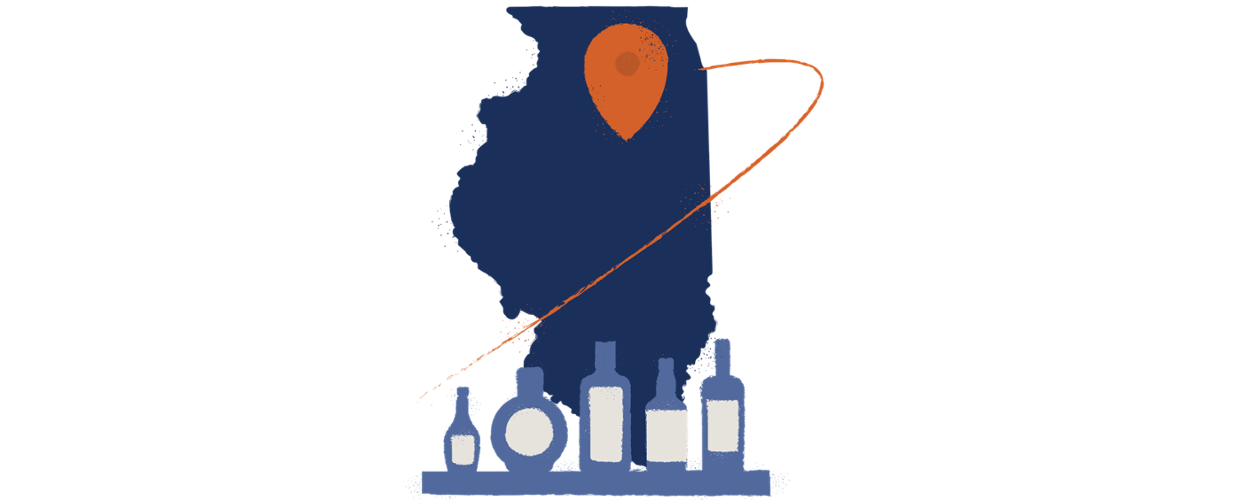
100 West Randolph Street
Suite #5-300
Chicago, IL 60601
Phone: (312) 814-2206
101 West Jefferson Suite 3-525
Springfield, Illinois 62702
Phone: (217) 782-2136
Website: https://www2.illinois.gov/ilcc/Pages/Home.aspx
The Illinois Liquor Control Commission is responsible for ensuring compliance with state liquor laws and regulations, issuing licenses, conducting inspections, evaluating violations, conducting hearings, working with the Illinois Department of Revenue to collect taxes, monitoring mail and internet orders of alcohol, providing industry education and ensuring responsible sales. The commission is overseen by a Chairman and six Commissioners, all of whom are appointed to six-year terms by the Governor and require confirmation by the Illinois Senate. The commission has four divisions: Licensing, Legal, Investigations, and Education & Training.
In addition to requiring a liquor license from the state, restaurants and bars will generally also need a license from their local municipality (or in the case of an unincorporated area, from the county). This page contains state-specific information, with an additional section dedicated to Chicago. For all other municipalities, be sure to check with your local government.
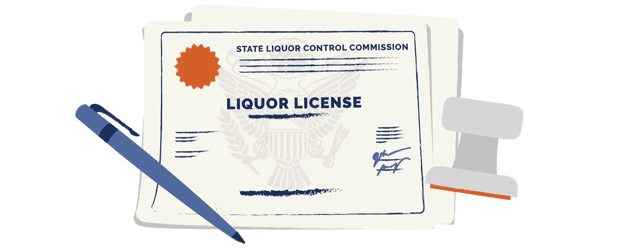
The Licensing Division has staff in both Chicago and Springfield and is responsible for reviewing state liquor applications and issuing over 200 new and 2,000 renewal state liquor licenses each month. There are 29 different license categories, but the most applicable to this page is the Retailer License which is required in Illinois to serve alcohol. Note that the term Retailer refers to both on and off-premise consumption, which includes any restaurant, bar or other establishment selling or serving alcohol. Once the application is received, it is typically reviewed within five to ten business days.
Applying for a new license requires filling out and submitting this Application Form. Licenses are valid for one year from the date they are issued. The fee for a state Retailer License is $750. License renewals can be completed online through the MyTax Illinois portal. Any changes made to the business' name, hours of operation, or corporate officers require completing a separate form to notify the state of the changes.
In addition to the Retailer License, there is also a Specialty Retailer License which covers brew pubs, winemakers that sell or serve, and caterers. The license fee for brew pubs is $1,500 and for winemakers and caterers is $500. Here is a link to these and all other applications and forms on the Illinois Liquor Control Commission website.
The Commission website maintains a searchable liquor license database. The database shows all the liquor licenses, expiration dates, and owners of the businesses. Obtaining information beyond what is shown in the database requires submitting a Freedom of Information Act (FOIA) request to the state. The state also maintains other databases and lists online for information such as recently expired licenses, renewed licenses, and delinquencies.
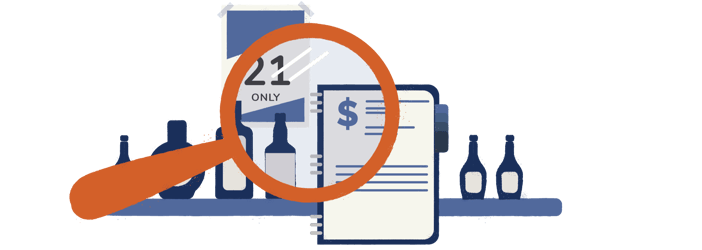
Special agents from the Investigations Division conduct liquor inspections at licensed establishments throughout Illinois. In addition to regular inspection of liquor establishments, agents also investigate and respond to complaints from the general public about violations. The division has a team of 24 agents that conduct approximately 26,000 routine inspections per year. Since the state has approximately 28,000 license holders, that means inspectors on average visit each establishment once per year.
This common violations PDF includes other typical violations.

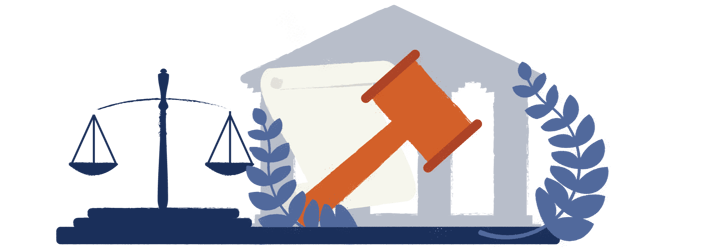
Laws in the state are governed by the Illinois Liquor Control Act. State law vests authority in the ILCC to set many rules and regulations. It is important to be familiar with both of these, especially the rules and regulations, as those generally contain more specific provisions and requirements for on-premise establishments to comply with. This section is not meant to be all-inclusive of state laws and regulations, but below are highlighted some specific laws or regulations that are applicable to restaurants and bars that are important or may not be well known. Nothing on this page should be construed as legal advice.
Payment for alcohol - Licensed retailers must pay for any alcohol they purchase within 30 days or else they will be considered delinquent. Wholesalers provide a list of delinquent accounts that goes to the state who then add them to a delinquent list and may then revoke their license. State law specifies that payment shall be made in cash, however, ILCC regulations clarify "Payment in cash by the retail licensee shall mean payment in legal tender as provided by the United States Code, checks (including certified checks, cashier's checks, teller's checks or traveler's checks), debit cards, drafts and electronic transfer of funds, provided the transfer of funds is initiated by an irrevocable payment order on or before the date payment is due. Checks are the equivalent of payment in cash so long as they are not post-dated and are deposited by the importing distributor, distributor, or manufacturer in the ordinary course of business." Note that if you own multiple locations and one becomes delinquent, then all locations are considered delinquent.
Hold on to invoices - Licensed retailers are required to keep on-premises invoices (or copies of invoices) for a period of 90 days. This is a common violation from the ILCC inspections and why it's nice to have digital copies of invoices saved and available instead of stuffing paper invoices into boxes or drawers. If you maintain a central business location where you keep your records in a different location than where you serve alcohol, you can obtain a waiver from the state, but you should have the waiver available to show inspectors upon request.
Sanitation - There are general sanitation requirements, but there are also specific requirements for beer and wine draft lines. The lines need to be cleaned at least once every week (it can be chemical or mechanical cleaning). The use of steam or hot water alone does not count as cleaning. You must also keep a record of the dates and person (with signature) when cleaning was done.
Inducements and accepting things of value - This won't get into all of the laws and regulations, but be aware there are a considerable number of them and they are important to know. They also can be quite confusing, because there are many carve-outs and exceptions. For example, distributors can service draft beer lines at regular intervals at a restaurant without it being considered an inducement, however free cleaning of coils by a distributor is considered a subsidy. Retailers generally can't accept things "of value" from their distributors or alcohol brands, except for specific exceptions, such as signage or product displays under a specific value. It's not only the distributors or manufacturers liable, retailers are held liable as well if they accept prohibited things of value.
No free giveaways - Establishments can't give away for free any alcohol for commercial purposes or bundled with the sale of non-alcoholic products or to promote the sale of non-alcoholic products. Bars and restaurants also can't advertise or promote giving away alcohol, including using the words "free" or "complimentary" with alcoholic liquor. This regulation was just enforced when Goose Island advertised giving away free beer as part of a contest for customers to try to make a field goal kick (after the Chicago Bears exited the playoffs on a missed field goal).
You can't buy from the liquor store - Illinois requires that you buy all of your liquor from a state-licensed distributor. So if you run of out a product during service, you can't run to the liquor store down the street to buy an extra bottle or two. This is a common inspection violation, and if found licenses are subject to a fine, suspension, or revocation of their license.
The Illinois Restaurant Association is the trade organization representing restaurants in the state. The Wine and Spirits Distributors of Illinois is the trade organization representing wholesalers for wine and spirits and the Associated Beer Distributors of Illinois represents beer wholesalers.
Complete Licensee Info Kit includes over a dozen free materials that will be sent to you, including required posters and signage, laws, ID guide, and more.
This ILCC events calendar includes a calendar of upcoming events, mostly BASSET training classes and board meetings.
The ILCC provides some audio clips with tips and information as well.
Illinois Happy Hours
In 2015, Public Act 099-0046 went into effect, which among other things allows happy hours and pricing discount promotions at restaurants and bars in the state of Illinois. While happy hours are now permitted, there are still specific regulations that you must comply with. Here are some of the rules to be aware of:
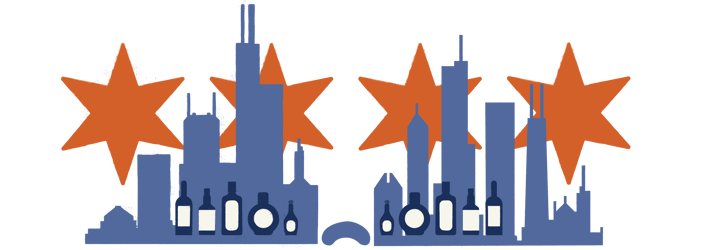
In addition to state liquor laws, municipalities have their own ordinances and regulations. This section provides additional information for the city of Chicago.
Overview of Process
Liquor licenses in Chicago are managed by the Business Affairs and Consumer Protection (BACP) division. Applicants must provide information on ownership and finances of the business. Restaurants and bars must pass inspections from the Departments of Fire, Buildings, and Health.
The city follows a case management approach to guide applicants through the process. A case manager from the BACP Division works closely with applicants in filing applications and makes sure they understand all of the responsibilities of a licensed liquor establishment in the City of Chicago. Once an application has been paid for, the City is committed to making a decision on license issuance within 90 days. These are the steps in the liquor license application process:
Liquor License Restrictions
Neighborhood sentiment is taken into consideration during the application process, with each registered voter within 250 feet of a proposed liquor license establishment is mailed a notice when an application is filed and can voice their opinion. Some parts of the city are designated as dry precincts or there may be a moratorium in certain areas that prohibit new licenses. Also, liquor licenses cannot be obtained for businesses within 100 feet of churches, schools, hospitals, libraries, or homes for the aged. This page provides more information on dry wards, moratoriums, and other restrictions, including an interactive zoning map for searching your location.
Types of Liquor Licenses
There are six classes of City of Chicago liquor licenses, along with several special and secondary licenses. Since this page is meant primarily for restaurants and bars, the below table only covers the major on-premise consumption licenses.
| License Name | Description | Fee |
| Tavern | This is required for establishments whose primary activity is serving alcohol, such as restaurants, bars, pubs, and lounges. Customers must be 21+ to enter. Establishments that offer live entertainment, charge admission for entry or have several amusement devices such as pool tables or arcade games may need a Public Place of Amusement license as well. |
$4,400 license $40 one-time Renewal: 2 years |
| Consumption on Premises (COP) | The COP license is for businesses where serving alcohol is secondary to their primary function, such as restaurants, theaters, or hotels. Additional licenses are generally needed based on the type of establishment, for example a public place of amusement license is needed for theaters and a retail food license is required for a restaurant. |
$4,400 license $40 one-time Renewal: 2 years |
| Outdoor Patio Secondary |
An Outdoor Patio License is required to sell alcohol in a privately owned outdoor location adjacent to premises and would require a Tavern or COP license. An outdoor patio must close by 11 p.m., Sun-Thurs, and 12am, Fri-Sat. Live or recorded music may not be played or performed. Late Hour Licenses do not extend to an outdoor patio. Businesses that have a Retail Food Establishment license and wish to operate on the public sidewalk need to also obtain a Sidewalk Cafe Permit. |
$1,760 license $40 one-time Renewal: 2 years |
| Late Hour Secondary |
Establishments that have a COP or Tavern license and want to remain open until 4am Mon-Sat and 5am Sun (normal requirement is 2am) need a Late Hour License. |
$6,000 license $40 one-time Renewal: 2 years |
Inspections
There are many different inspections required as part of both the application process as well as on an ongoing basis. This is a summary of inspections applicable for most restaurants and bars. The city offers free workshops to help prepare for inspections. See this workshop calendar for dates. If you do not pass your first inspection, you can resolve any issues and schedule a re-inspection. You can check the status of inspections by talking with your consultant or the city has an easy-to-use online portal.
Health (Food Protection) - The Food Protection Division of the Chicago Department of Public Health inspects your facility to promote public health in areas of food safety and sanitation. If your establishment sells food, a Food Service Sanitation Manager must be present at the time of inspection (the state relies on ServSafe).
Fire Prevention - Fire inspectors will visit your establishment and check for safety measures. Their primary inspections are focused on there being proper exit structures in case of emergency, aisles that exist are easily accessible, and escape routes and building systems are in good condition. An occupancy card must also be posted in a visible location if the room capacity exceeds 100 people.
Department of Buildings - Building Inspectors will be concerned with many of the structures that the Fire Department inspects, but for different reasons. While the Fire Department ensures that your building is fire-resistant and easy to evacuate in case of emergency, the Department of Buildings ensures that structures, electrical components, emergency lighting, ventilation, plumbing, and other areas meet building codes. Visit the Department of Buildings website to learn more about building inspections.
Annual Inspections - Once you have a license, the City will periodically inspect your establishment. Your establishment may be subject to the following types of inspection listed below:
Scheduled Annual Inspections for Eating Establishments - The Department of Buildings will conduct annual inspections for businesses that hold a Retail Food Establishment License. Businesses are given four weeks' notice of the inspections which will be completed during the non-peak hours of 9-11 am and 1-3 pm. Inspection fees are based on the square footage of the business location and will be billed with your annual license renewal.
Public Place of Amusement License (PPA) Inspections - Businesses holding a Public Place of Amusement License are required to pass an annual inspection by the Department of Buildings. PPA licenses will not be renewed until your establishment has passed inspection. The Department of Buildings will contact you to schedule an inspection of your licensed PPA establishment. The PPA License inspection fees are based on the square footage of the business and will be billed separately from your renewal fees.
Unannounced Inspections - The Departments of Health and Fire will conduct random unannounced inspections of all establishments that offer food. The Dumpster Task Force also conducts unannounced inspections to ensure compliance with sanitation requirements. In addition, all city departments respond to public complaints and these inspections will be unannounced.
Other Information
Some regulations and tips for establishments within Chicago:
For ordinance information related to liquor see The Chicago Municipal Code, Chapter 4-60.
Testing, tracing, and treatment are widely available throughout the state. With new health and hygiene practices permanently in place restaurants and other sectors are free to open again and gatherings of all sizes can resume.
Phase IV of the Restore Illinois plan was put into effect at the end of June. Phase IV is known as the "Revitalization Phase." While some things have changed, there are a few constants that have remained the same:
Phase IV will allow for indoor dining, and restaurants can now accommodate parties of up to 10 people. While there is not necessarily a cap on guests, standing areas are not permitted to be at more than 25% capacity, and your tables must be 6 feet apart. This is what determines your capacity.
Unlike Phase III, indoor waiting areas will be open for guests. However, should the area reach higher than 25% capacity, guests need to wait outside in a designated area. At all times possible, ensure that guests of separate parties are remaining at least 6 feet apart. As with Phase III, visual markers can be helpful to determine safe standing distance.
Continue to display signage outside your establishment that states mask requirements and social distancing guidelines before entering. If possible, use signage to direct one way traffic in and out of your restaurant to limit potential congregation.
Tables and chairs must be thoroughly disinfected before guests can be seated. Common spaces and high traffic areas (door knobs, restrooms, hand rails, etc) must be cleaned and disinfected routinely. It is recommended to do this every hour or so.
Items that are shared among guests (such as menus, pens, and check presenters) need to be sanitized immediately after use. You must use sanitizer that meets the EPA's criteria. You can find the EPA's requirements here.
Helpful tips:
Presets and communal table items (i.e. napkins, condiments, table tents) are still not permitted. However, self-service areas and buffets are now permitted with added guidelines:
Employees must maintain a social distance from guests and coworkers when not directly engaged in a service related task. They must wear PPE at all times (cloth face masks are preferred).
Encourage employees to self-assess their symptoms and be mindful of their health. If an employee reports symptoms, they must remain at home in isolation for 10 days. They cannot return to work until they are without symptoms and fever for 3 days, or they have tested negative for coronavirus (with two tests in a row, 24 hours apart).
Any employee that has had close contact with a co-worker that tests positive for coronavirus needs to self-quarantine for 14 days and is encouraged to be tested by their health care provider.
Hand soap, potable water, paper towels, and sanitizer must be made readily available to your employees and guests. Ensure that your staff is washing their hands every 30 minutes, or after completing a task (such as eating, drinking, smoking, using their phone etc.)
Display visible signage for your employees that shows the signs and symptoms of coronavirus. Management should conduct daily wellness checks before and after service, and conduct temperature checks if possible. This guide outlines questions you should be asking your staff before they interact with any guests.
Management should stagger break times and shift times, and try to schedule employees in groups to limit exposure to one another. If an employee tests positive for COVID-19, the employer needs to contact the local health department within 24 hours.
Kitchen and food preparation areas need to be cleaned and sanitized frequently and consistently. Ensure that anyone preparing or cooking food is wearing gloves and a mask at all times.
Ensure that all kitchen staff have access to the appropriate personal protective equipment (PPE).
Phase III of the Restore Illinois plan was put into effect at the end of May, with industry specific guidelines laid out for restaurants and bars. These guidelines are to be followed until the commencement of Phase IV, which is projected to begin at the end of June. All operations must continue to adhere to the existing social distancing guidelines, as well as additional wellness, safety, and sanitation protocols.
In Phase III, only outdoor dining is permitted. Exceptions can be made with establishments that are able to open up at least 50% of their indoor space by removing or opening windows, outdoor panels, coverings, etc.
Keep in mind:
Restaurants must display signage outside their business that lists the health and safety regulations for dining amid COVID-19. This includes the need for face coverings, social distancing, and personal hygiene standards.
Guests, as well as employees, must comply with these guidelines.
Common spaces, such as waiting areas, cannot be occupied. Guests must either wait in their vehicle, or outside the establishment from a safe distance. Necessary common areas, such as restrooms, will need to be routinely cleaned and sanitized, ideally every 30 minutes. Water fountains should be blocked off or disabled.
All self-service areas, such as food or beverage stations, are no longer permitted. Silverware presets and shared items such as condiments and menus are no longer allowed on tables. Single serve and disposable items are encouraged wherever possible.
Helpful Tips:
New and returning employees must complete COVID-19 training before working. This checklist will get your staff up to speed on requirements and best practices. Employees cannot work if they are displaying any symptoms, however mild.
Employees should be washing their hands every 30 minutes, or if they have recently completed a task (including but not limited to: restroom use, eating or drinking, handling food or dishes, etc). Employees should wear a mask at all times.
Hand soap, paper towels, and sanitizer must be made readily available to your employees and guests. Door knobs, railings, and other high touch areas should be frequently cleaned by management, ideally every 30 minutes.
Kitchen and food preparation areas need to be cleaned and sanitized frequently and consistently. Ensure that anyone preparing or cooking food is wearing gloves and a mask at all times.
Management should conduct regular wellness screenings of their staff. If possible, temperature checks before the beginning of service are encouraged. This guide outlines questions you should be asking your staff before they interact with any guests.
Provided Phase III continues to see a decline in new COVID-19 cases, Phase IV will go into effect at the end of June. While Phase III is known as the "Restore" stage, Phase IV is known as the "Revitalization" stage. We will see the strict guidelines in Phase III somewhat lessened, but masks and social distancing will still be enforced.
What to know:
Fill out the form on the right and we'll email you a PDF version to download and print as a quick reference sheet.